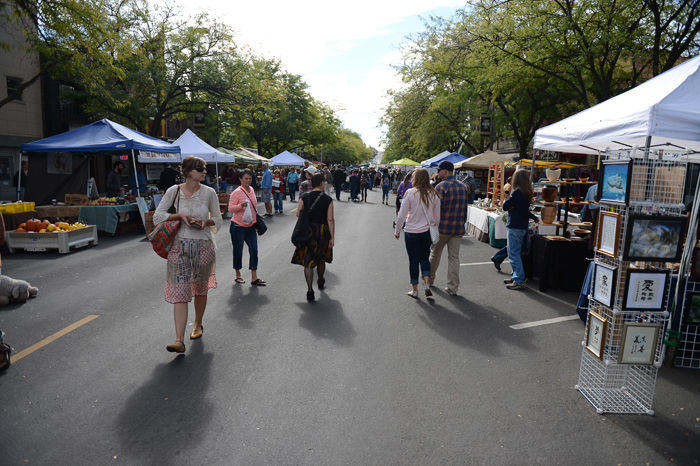An ode to farmers markets
May 18, 2016
My dear readers, let me indulge in some shameless plugging: find a way to get to the Moscow Farmers Market, happening every Saturday – rain or shine – from 8 a.m. to 1 p.m. from May to October in downtown Moscow.
For me, farmers markets can appeal to everyone: the conservative capitalist who wants to see free enterprise in action; the liberal who wants poorer families to be able to access fresh, nutritious food; the artisan who loves local crafts; and the localist looking to build hometown culture.
The market showcases produce, meats, wines, soaps, paintings, carvings and a myriad of other wares from all over Idaho. These days also gives Moscow shops the ability to open their doors and invite in curious customers.
Tyler Laferriere is a graduate student pursuing his master’s in economics from Phoenix, Arizona. He can be contacted at 335-2290 or by [email protected]. The opinions expressed in this column are not necessarily those of the staff of The Daily Evergreen or those of The Office of Student Media.
Philosophically, I have deep connection to the farmers markets. During my later undergraduate studies, I became deeply interested in cooperative economics and a philosophy called Distributism.
Based upon Catholic social teaching – bear with me folks, I am not trying to convert you – Distributism advocated a middle road between cutthroat laissez-faire capitalism and the destructive redistribution under revolutionary socialism. Contrived by Hilaire Belloc and G. K. Chesterton in late nineteenth and early twentieth century England, it proposed property and the means of production not collectively owned by corporations or government but distributively owned by as many people as possible. In essence, it prescribed as many as possible on their own land and capital to create a society of many small-time entrepreneurs.
Now, I will not quibble about the merits of Distributism vis-à-vis capitalism and socialism, but the point is this: local, artisanal projects like farmers markets realize this vision of many small-scale entrepreneurs employing their labor, capital and creativity to bring quality goods to market. They provide opportunities not for vast wealth but for local brands to gain introduction, make a profit and ultimately reinvest in themselves and their local communities. In a way, these markets realize the ideal of the Jeffersonian republic: many small-scale capital owners and landholders coming together in a commercial forum to interact and build robust, vibrant communities.
The USDA reports 8,476 farmers markets across the country. The Moscow Farmers Market reports on its website that it has been a local institution since 1977. In other words, farmer markets are not the domains of Seattle or Portland hipsters. Rather, they are all around us, in our backyards, both in Pullman and in Moscow. They are not some radical attempt to take back our consumptive habits from big corporations. Rather, they are that most noble and humble undertaking of local communities to provide access for buyers and sellers to each other without middlemen. They are the vanguard of the arts and crafts movement on the Palouse, and they are essential transmitters of our local culture.
The beauty of the Moscow Farmers Market this past weekend was that it truly was an open-air agora. Political candidates had campaigners and tables; breakfast and lunch were readily available both from vendors and local restaurants; and some talented local women gave us musical accompaniment on their stringed instruments.
Dare I say, the farmers market sort of America is the America I want to live in. It was the most magnificently civil, democratic and non-corporately capitalist environment I’ve experienced in some time. For a brief five hours in the day, we were neither Republican nor Democratic, rich nor poor, UI nor WSU. We were the citizens of Eastern Washington and North Idaho celebrating our agricultural and crafted arts.
If you are still a skeptic of the farmers market, a 2013 article in AgriNews reported $7 billion in sales from local foods vendors in 2012, and that was just in local foods. Combine that with arts and crafts, that number in 2016 will likely be even higher. So for the dogged materialists out there: local markets don’t just make us better Americans; they make us richer Americans, too.
Tyler Laferriere is a graduate student pursuing his master’s in economics from Phoenix, Arizona. He can be contacted at 335-2290 or by [email protected]. The opinions expressed in this column are not necessarily those of the staff of The Daily Evergreen or those of The Office of Student Media.





















